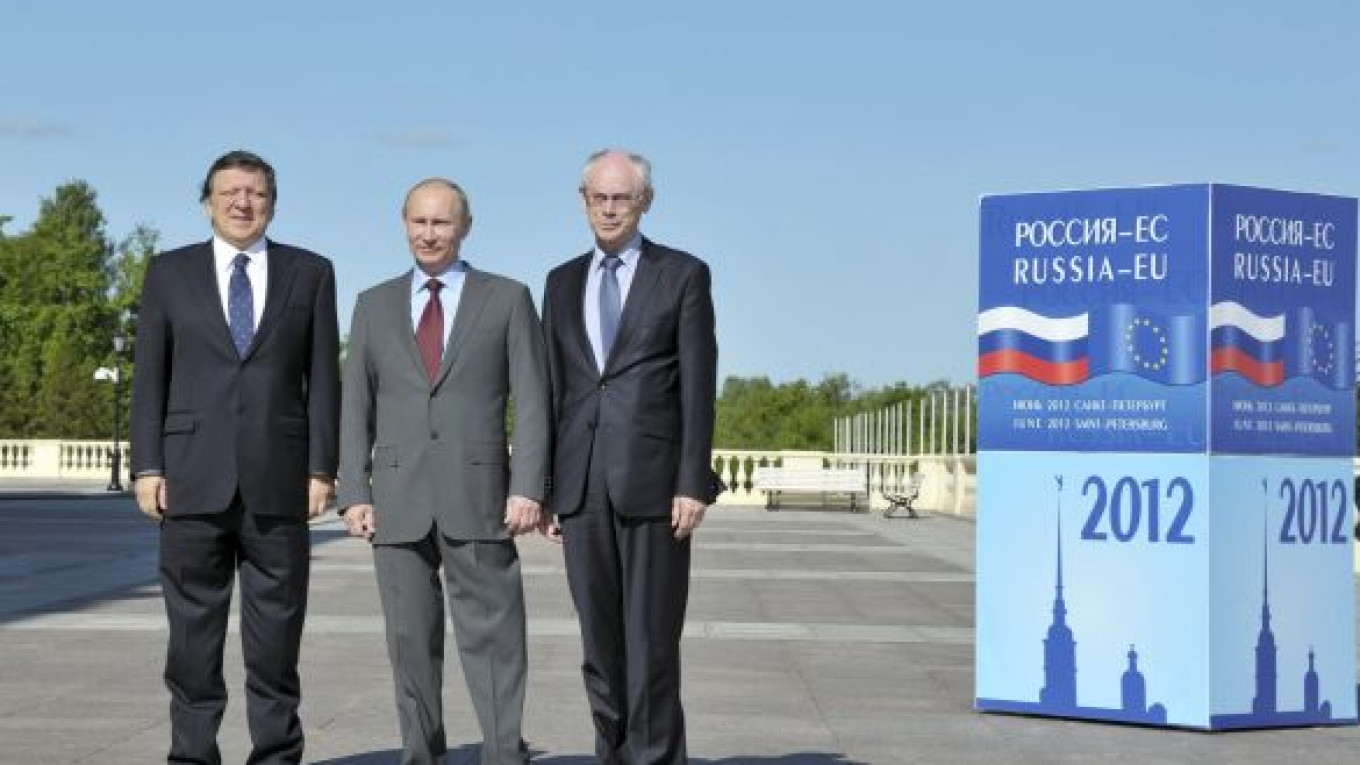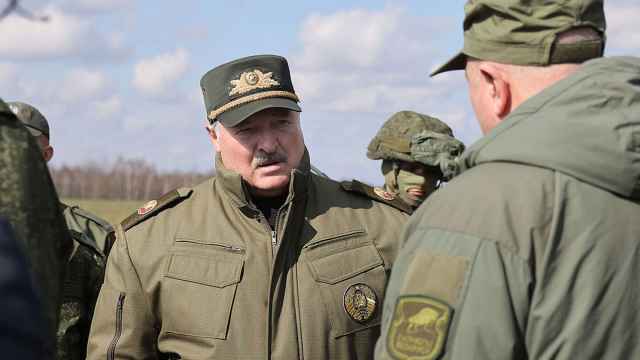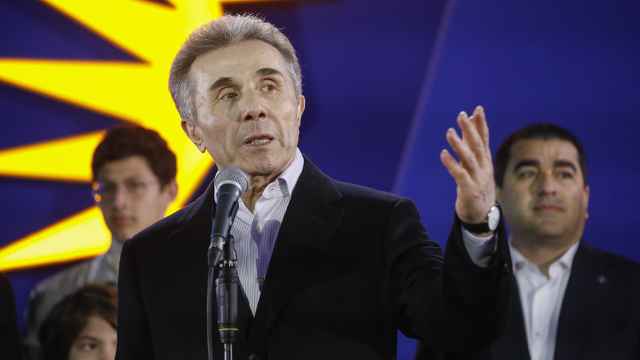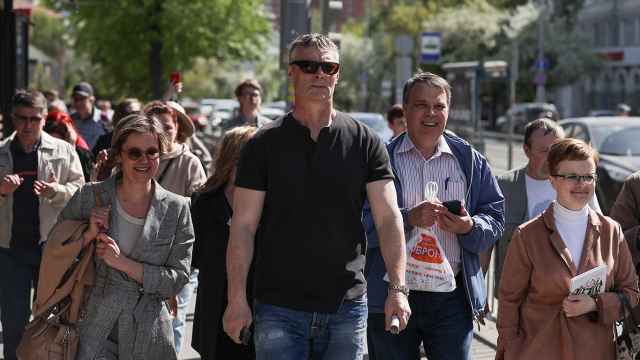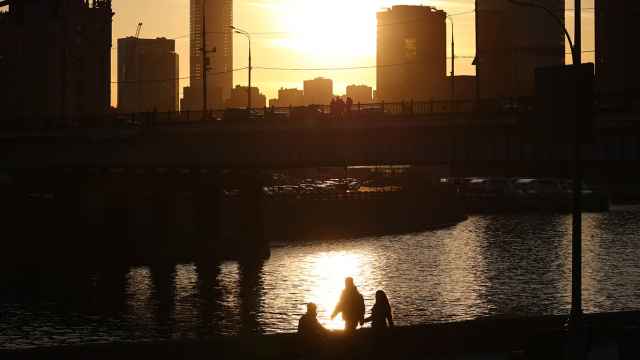ST. PETERSBURG — President Vladimir Putin on Monday offered European Union leaders help in their fight against a deepening debt crisis, on the same day that the ruble slid to new lows against the euro.
Putin also defended Russia’s democratic system and laughed at a call for him to be sent to prison.
Speaking at a joint news conference with European Council President Herman van Rompuy and European Commission President Jose Manuel Barroso in a lavish, baroque palace outside St. Petersburg, Putin acknowledged that a European recession would directly affect Russia’s economy.
“We are ready to cooperate in this process because we are also interested,” he said, adding that he hoped the European Union manages to overcome its deepening currency crisis.
Putin did not elaborate on how Russia would help Europe.
Barroso said that the 27-member bloc would focus on establishing sustainable growth from within and stressed that more integration was necessary to make that happen. He also said cooperation with EU neighbors like Russia was vital.
“We need to do more together. Trade and investment are also important drivers for growth,” he said.
Van Rompuy said the EU would welcome Putin’s plan of integrating former Soviet states into a Eurasian Union — if that organization obeys World Trade Organization standards.
The three presidents spoke after the first Russia-EU summit since Putin’s return to the presidency last month.
Although Putin expressed unhappiness with aspects of Europe's energy and trade policies and stressed that he would give priority to his Eurasian Union plans, all sides sounded upbeat about the talks, which wound down Monday afternoon.
“It was really productive, and the Russians did not show the obstinacy typical of previous summits,” said a member of the EU delegation, speaking on condition of anonymity because he was not authorized to speak to the media.
The European Union and Russia hold two summits per year, alternately on each other’s territory.
Much of Monday’s summit focused on the possibility of starting talks about a wide-ranging bilateral agreement between both sides. The new framework agreement is supposed to replace an agreement dating from the 1990s and has long been stalled by Moscow’s protectionist trade policies.
While the main obstacle disappeared after Russia finally signed up for WTO membership in December, Putin argued that the EU is demanding Moscow abide by obligations that go beyond those made for joining the international trade watchdog.
“We call this WTO plus. We cannot agree on these suggestions yet,” he said.
EU officials pointed out that Moscow’s WTO accession has yet to be ratified by the State Duma and that the Russian side had asked that talks on a framework agreement begin only after the economic effects of WTO membership become clearer.
In a sign that business is increasingly nervous about these effects, a group of businessmen published an open letter to the government last week, in which they asked for additional protection against outside competition. Prime Minister Dmitry Medvedev on Monday called upon the State Duma to ratify the country’s accession.
Putin said that the Kremlin would try to minimize those risks by using instruments “fully in accordance with WTO rules.”
Barroso said that once such an agreement was in place, both sides could work toward Putin’s vision for “a free trade zone from Lisbon to Vladivostok.”
Barroso also said that the EU’s modernization partnership with Russia envisages not just economic but political reforms and demanded that the Kremlin press on with improving democratic institutions and the rule of law.
But Putin faced the toughest question from a reporter who read out from a flyer, in which the Other Russia opposition movement headed by dissident writer Eduard Limonov called the president a tyrant who deserves to be in prison.
“Putin behind bars, Barroso to the pillory” read the flyer, which activists handed to journalists outside their St. Petersburg hotel. It criticized Barroso for shaking hands with Putin because “dealing with this man is a shame.”
A bemused Putin quipped that he would go to prison “only in good company” and that he viewed such calls with sympathy.
“The question is just, why they do it in such an unusual way. We have other means to state your position,” he said, adding that the barriers to form political parties were recently lowered.
He caused laughter by saying that the call for Barroso to be pilloried, a medieval form of public humiliation, must be connected to the EU’s Third Energy Package.
“I must tell all interested sides that we have expressed our worries about this document and hope that we can solve these problems during the negotiations,” he said.
Brussels and Moscow have sparred over the EU’s energy market regulations, which are intended as a liberalization but are seen by the Kremlin as hampering conditions for its energy corporations.
Putin also reiterated his position that it was wrong to call jailed Yukos founder Mikhail Khodorkovsky a political prisoner and that this was also found by the European Court of Human Rights.
Khodorkovsky's lawyer Maxim Klyuvgant quickly attacked Putin's argument, noting to Interfax that the Strasbourg-based court only found that the businessman's arrest in 2003 had been without political interference.
The president also put visa policy high on the agenda by claiming that existing travel requirements are an “obstacle for promoting human contacts and the economy” and that a true partnership is only possible after scrapping visas.
The issue has become a constant battleground between both sides in recent years, with Moscow claiming that visas could be scrapped anytime, while European officials point out that Russia lacks the infrastructure to ensure migration safety.
Both sides agreed at the last summit in December to fulfill a more than 40-item common steps program that seeks to address these issues, and Moscow said it wants to carry this out by 2013.
A Message from The Moscow Times:
Dear readers,
We are facing unprecedented challenges. Russia's Prosecutor General's Office has designated The Moscow Times as an "undesirable" organization, criminalizing our work and putting our staff at risk of prosecution. This follows our earlier unjust labeling as a "foreign agent."
These actions are direct attempts to silence independent journalism in Russia. The authorities claim our work "discredits the decisions of the Russian leadership." We see things differently: we strive to provide accurate, unbiased reporting on Russia.
We, the journalists of The Moscow Times, refuse to be silenced. But to continue our work, we need your help.
Your support, no matter how small, makes a world of difference. If you can, please support us monthly starting from just $2. It's quick to set up, and every contribution makes a significant impact.
By supporting The Moscow Times, you're defending open, independent journalism in the face of repression. Thank you for standing with us.
Remind me later.



